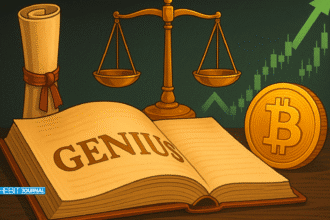Based on the latest reports, Senator Cynthia Lummis announced at the 2025 Bitcoin Conference in Las Vegas that several high-ranking U.S. military generals support the creation of a strategic Bitcoin reserve. This endorsement, according to Lummis, is an accepted digital asset in bolstering national strength in an era of geopolitical and technological transformation.
Lummis, known for her long-standing advocacy of Bitcoin and blockchain technology, revealed that her discussions with senior military officers showed a shared understanding: economic power, specifically through Bitcoin, is as important as military might in addressing threats from global adversaries.
A Digital Gold Reserve: Bridging Economic and Military Power
Lummis pointed to parallels with Fort Knox, where the U.S. holds roughly 5% of the global gold supply. In her vision, a federal Bitcoin reserve, comprising approximately the same share of the 21 million-coin total supply would reinforce America’s economic backbone while leveraging its technological leadership.

This approach follows President Donald Trump’s March 7 executive order that formalized the establishment of a strategic Bitcoin reserve and a broader digital asset stockpile. The executive directive highlighted the urgency of aligning the U.S. Treasury with the evolving digital financial ecosystem
On March 11, Lummis, alongside five other Republican senators, reintroduced legislation to accumulate up to 1 million BTC within five years. This legislative effort, colloquially referred to as the “Bitcoin Reserve Bill”, proposes consolidating confiscated Bitcoin assets and initiating federal acquisitions to build a robust digital reserve. According to proponents, such a reserve would serve both economic and strategic purposes, safeguarding national interests against adversaries and economic disruptions.
State-Led Momentum and Federal Convergence
The federal push for a Bitcoin reserve is not happening in isolation. Lummis shared how individual U.S. states are serving as incubators for innovative financial policies. This year, New Hampshire became the first state to formally establish a strategic Bitcoin reserve, authorizing up to 5% of public funds to be allocated to Bitcoin and other digital assets.
Similarly, Arizona enacted legislation (House Bill 2749) creating a state-level Bitcoin and digital assets reserve fund. The fund will hold unclaimed digital assets for three years, after which they may be liquidated or reallocated.
Texas has also advanced legislation to establish its own strategic Bitcoin reserve. The state’s ongoing debate and policy development show a growing recognition of digital assets’ strategic potential at both state and federal levels. According to Lummis,
“states like Texas are forging ahead, showing that integrating Bitcoin into public reserves is not only feasible but increasingly necessary.”
Global Support and Geopolitical Context
International developments bolster Lummis’s argument for a federal Bitcoin reserve. In the United Arab Emirates, the Abu Dhabi sovereign wealth fund Mubadala recently ramped up its exposure to Bitcoin, investing nearly $408 million in U.S.-based Bitcoin exchange-traded funds (ETFs).
This demonstrates that sovereign wealth funds outside the U.S. are already leveraging Bitcoin to strengthen their financial positions, potentially challenging America’s economic influence.
In Europe, the Czech National Bank is evaluating the inclusion of Bitcoin in its foreign exchange reserves.
Lummis noted, “That’s good for America because they’re going to build their sovereign wealth in Bitcoin through an American ETF,”
These global trends lend weight to Lummis’s call for the U.S. to formalize its own Bitcoin reserve policy before other nations lock up larger portions of the finite 21 million BTC supply. In her view, delaying action risks ceding economic influence to other sovereign actors.

Energy Policy and Industrial Synergy
Central to Lummis’s vision is the synergy between Bitcoin mining and national energy policy. She credited China’s 2021 mining ban for accelerating Bitcoin’s hash rate migration to North America. According to her, this represents a critical opportunity for the U.S. to align energy production with digital innovation. She emphasized that combining domestic Bitcoin mining with federal accumulation strategies would grant Washington a “geopolitical advantage,” reinforcing both industrial capacity and financial resilience.
Critics argue that Bitcoin mining’s energy consumption is unsustainable, while advocates like Lummis view it as a driver of energy innovation and grid stability. By integrating mining operations with energy infrastructure, the U.S. could simultaneously support renewable energy development and strengthen its digital asset reserves.
Challenges and Criticisms
While military support lends credibility to Lummis’s initiative, it also raises concerns about the militarization of financial policy. Some observers caution against framing economic strategy through a defense lens, suggesting that this approach might escalate tensions with global adversaries, particularly in the context of U.S.-China relations.
Nonetheless, Lummis and her allies contend that strategic inaction carries greater risks. They argue that failing to secure a meaningful Bitcoin reserve could leave the U.S. vulnerable to economic coercion or technological displacement as rival nations and entities embrace digital assets.
Looking Ahead: A Digital-First Financial Future
Lummis’s proposal, coupled with military endorsement and state-level initiatives, suggests a tipping point in the discourse around Bitcoin’s role in national policy. Whether or not the federal government adopts her vision in full, the momentum toward integrating digital assets into public finance appears irreversible.
For now, the focus remains on legislative developments, with the BITCOIN Act awaiting further congressional debate. Meanwhile, global financial institutions, sovereign wealth funds, and central banks will likely continue to expand their exposure to Bitcoin, reinforcing its role as “digital gold” in an increasingly interconnected economic landscape.
As Lummis put it, “We have a finite window to act. If we wait too long, others will dominate the future of digital wealth. America must lead.”
FAQs
What is the strategic Bitcoin reserve?
It refers to a proposed national stockpile of Bitcoin held by the U.S. government to strengthen economic resilience and counterbalance global financial threats.
Who supports the U.S. Bitcoin reserve proposal?
Senator Cynthia Lummis and several U.S. military generals endorse the plan. States like New Hampshire, Arizona, and Texas have introduced similar measures.
Are other countries pursuing similar strategies?
Yes. The UAE’s Mubadala fund has expanded Bitcoin investments, and the Czech National Bank is studying Bitcoin’s potential inclusion in reserves.
What are the risks of a U.S. Bitcoin reserve?
Potential risks include price volatility, regulatory challenges, and the environmental impact of Bitcoin mining. Critics argue for caution and robust oversight.
Glossary of Key Terms
Proof-of-Work Mining: The process of validating transactions on the Bitcoin network through computational power.
Sovereign Wealth Fund: A state-owned investment fund that manages national assets for long-term growth.
Strategic Reserve: A stockpile of assets held by a government to ensure economic stability and security.
Digital Asset ETF: An exchange-traded fund that provides exposure to digital assets like Bitcoin.
Sources
White House Executive Order on Strategic Bitcoin Reserve
Mubadala’s Bitcoin ETF Investment
Czech National Bank’s Bitcoin Study





























